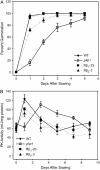Arabidopsis seedlings deficient in a plastidic pyruvate kinase are unable to utilize seed storage compounds for germination and establishment
- PMID: 17965177
- PMCID: PMC2151681
- DOI: 10.1104/pp.107.108340
Arabidopsis seedlings deficient in a plastidic pyruvate kinase are unable to utilize seed storage compounds for germination and establishment
Abstract
Catabolism of storage reserves and biosynthesis of metabolites necessary for growth are essential for seed germination and establishment. An Arabidopsis (Arabidopsis thaliana) mutant (pkp1) deficient in plastidic pyruvate kinase (PK(p)) and unable to accumulate storage oil to the same extent as the wild type shows delayed germination and seedling establishment dependent on an exogenous sugar supply. It appears, however, as though these phenotypes are not entirely caused specifically by lack of seed oil and may be related to reduced PK(p) activity in germinating seeds. Increasing the sucrose concentration in the medium further inhibits germination of pkp1, possibly due to the accumulation of soluble sugars in seeds. Germinating seeds of pkp1 are unable to metabolize storage oil and cannot utilize applied sucrose for hypocotyl elongation in the dark. Moreover, pkp1 contains less tocopherol and chlorophyll than the wild type. Taken together, the results are consistent with a model in which PK(p) is required for the efficient conversion of sugar into precursors for different anabolic pathways.
Figures








References
-
- Baud S, Boutin J, Miquel M, Lepiniec L, Rochat C (2002) An integrated overview of seed development in Arabidopsis thaliana ecotype WS. Plant Physiol Biochem 40 151–160
-
- Baud S, Wuilleme S, Dubreucq B, de Almeida A, Vuagnat C, Lepiniec L, Miquel M, Rochat C (2007) Function of plastidial pyruvate kinases in seeds of Arabidopsis thaliana. Plant J 52 405–419 - PubMed
Publication types
MeSH terms
Substances
LinkOut - more resources
Full Text Sources
Other Literature Sources
Molecular Biology Databases

